Peter Greenberg interview
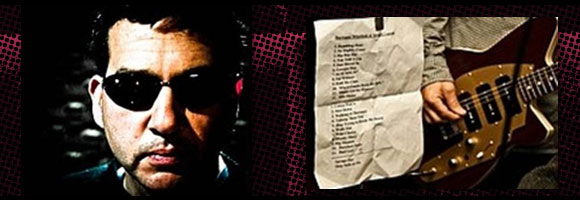
By Martin Savage
Peter Greenberg should need no introduction to the readers of Savage. As the guitar slinger for such amazing bands as DMZ, the Lyres, the Customs and Barrence Whitfield and the Savages he’s made his mark on some of the greatest garage/punk records since the mid-70’s. A couple of years ago Barrence Whitfield and the Savages decided to pick up the battle-axe, recorded a new record for Munster and went on tour across the globe. When they hit Stockholm in October 2011 we were of course there and decided to do an interview with Peter. It was done in 2012 through e-mail.
My band the WildFangs opened up for a reunited Barrence Whitfield and the Savages in October last year. As I understand it, it's your first venture back into music in a long time. What caused you to pick up music again and what made you stop the first time around?
When I quit playing in 1986, I had logged 11 solid years of playing rock and roll in four bands and was 30 years old. I like change and I was ready to try something new. During my tenure with Barrence Whitfield and the Savages, I had received a graduate degree and wanted to try out working which I did. I got married to my wife Milissa and I had two great boys and my career in business was relatively successful. Nothing I did at work was even close to the thrill of playing rock and roll. I decided in 2007 that I'd better get back at it while I still could and tested the waters to play again. Initially, I played some reunion shows with DMZ, Lyres, and the Customs. I started a band, Manby's Head in Taos, New Mexico where I live and recorded a CD which has been fun. And then I got back with Barrence Whitfield who can sing even better now than he did 25 years ago. We recorded a new LP and are planning another. This is not a reunion, we are picking up where we left off...
Obviously a lot of the music you have recorded has become, I guess, way more known now than when the bands actually played. An example is bands like King Salami and the Cumberland 3 doing Barrence Whitfield and the Savages covers to DMZ records being reissued. That must feel pretty good. What are the major differences in playing rock'n'roll now compared to when you played back in the 70s and 80s?
Well, I wasn't aware of much going on after the mid-80s until around 2007 or so when I did the first Customs reunion. I now consider myself "frozen in ice" during that period. I cut myself off from music completely and did the business crap. So in 2007 I was like a frozen caveman revived after 25 years in ice. I came out exactly like I was in the 70s and 80s from a playing perspective. I hadn't tried to "learn" anything new. We always thought we were good in the 70s and 80s even though not that many others did. It's great that people like our stuff. There is a greater appreciation of the "classic" stuff now. Now the Stooges and Ramones are on TV commercials! It's still tough for us in the USA. We do well along the east coast and places like Austin, TX but there is more of a throwaway view of music here and less respect for the past. It's better in Europe as it was for the bluesmen going over there in the 1960s. I guess bands like mine are the modern-day blues guys heading back to Europe.
So do you consider the Savages to be your main band now and are you going to continue playing together?
Yes. I am committing myself to Barrence Whitfield and the Savages at this point. We have a great band and Barrence still has it. In fact, I think he can sing and scream even better now than 25 years ago. We also all get along well and can manage month-long tours without killing each other. Other unnamed bands I've played with in the past would clearly kill each other if on the road for a month together... The Savages are playing regularly although we live in different cities in the USA. Playing Austin, TX June 29 and 30 and a French festival in August. We will play the Midwest USA in the Fall while recording our new LP. We may play Australia this Winter at Big Day Out and plan to head back to Europe once the new LP is out... I am also playing sporadically and writing songs with Mike Mooney (Manby's Head) in Taos, NM where I live.
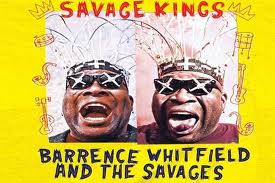
How has the reception of the new album been?
The new LP has done well. It's fresh sounding with a lot of energy and purposely not a rehashing of our older approach. It's gotten good reviews and sold well. We basically got the band together in Cincinnati in Dec 2010 without having played together, learned 15 songs that we pulled together, and recorded most of them the following week. Given our methodology, I think it came out great. I have high hopes for our next LP which we plan to record this Fall. We are already playing some of the material on the road...
Munster also released "Radio Demos" by DMZ which is probably my fave DMZ record! It consists of recordings made in 1976. How did that happen, what can you tell me about these recordings?
The Savages are recording for Munster these days. A couple years ago, Munster asked if I had any old DMZ or Lyres in storage. I turned up a cassette of a Lyres live show from 1982 that was really good. Mike Lewis, DMZ's original bass player had some good copies of various radio shows we recorded in Cambridge in the Summer of 1976. I checked with Jeff who signed off on the releases and then sent them off to Munster...
Ok, now I wanna go back to the beginning. When and how did you first get into music and when did you form your first band?
I started to learn how to play guitar when I was 13 in Massachusetts. My friend Paul had an older brother who was into blues so that’s what we started playing together. I played guitar and harmonica. We'd wack away at it in Paul's attic. Paul's brother took us to our first concert in 1970. It was the MC5 at Salem State Teachers College. It changed my life.
What were your main influences in the beginning?
I had a few major early influences. Wayne Kramer and Fred Smith were two of them. Also was into Peter Green and Danny Kirwin of Fleetwood Mac among others. Of course, I was into all the great Chicago blues guitarists like Hubert Sumlin. Later on Cyril Jordan and Ron Ashton came into the picture...
How old were you when DMZ started playing?
Well, I had moved up to Boston to go to Emerson College from Cincinnati Ohio in 1975 when I was 18. I had friends from High School in Cincinnati also going to college in Boston. I had played with them a bit in High School. They were Mike Lewis, DMZ’s first bass player who was going to MIT and Adam Schwartz who was DMZ's first singer and was going to BU. Adam was friends with Jeff Conolly who also went to BU and that’s how Jeff learned about us. I also had a friend at Emerson who was a drummer and strangely his name was also Mike Lewis. At the same time, I was also working as a volunteer at WBCN in the Fall of ’75 and I met JJ Rassler there. He was working as an assistant for one of the DJs. We hit it off and he started coming over to play with us too. So we started playing at our bass player Mike Lewis’ MIT frat house in the Fall of 1975 when I was 19.
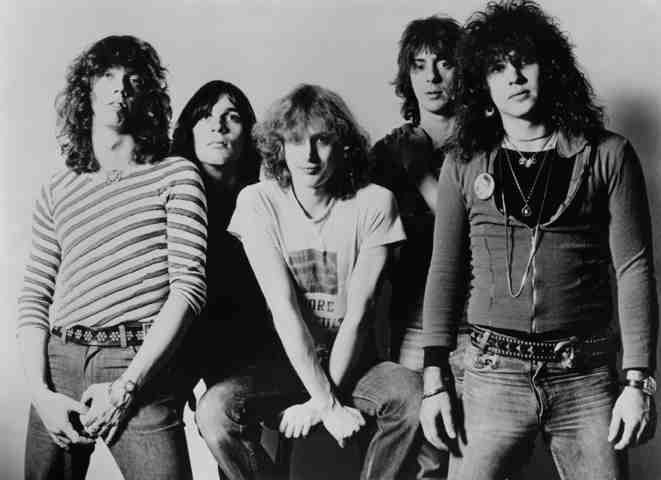
When and where did you do the first DMZ show and how long did it take to get your first single out?
We did the first DMZ show in Feb 1976 at Mike Lewis's (our bass player's) frat house in Kenmore Square across from the Rat. "Adam Bomb" was the singer although Mono Man attended the show. People liked it and we were encouraged. Our first record was two songs on the live at the Rat double LP. It was recorded during the Summer of '76 and came out a few months later. Mono Man was our singer and David Robinson from the Modern Lovers was our drummer. Our 4 song Bomp EP was recorded in late winter '77 and came out that Summer.
Did you have any visions for the band at that point or were you happy just being in a band?
Things were jumping in Boston and NYC by then and by the time the Bomp EP came out, Danny Fields had pretty much sold Sire Records on us so things moved fast. In retrospect it would have been better if it didn't!
Nowadays people often refer to "the Boston scene" with the Real Kids, DMZ et al. When did you become aware of each other and did it feel like a scene back then?
We hit it off with the Real Kids right away. Mike Lewis and David Robinson left in the Fall of '76 and we replaced them with two guys who had a history playing in John Felice's bands, Rick Corraccio and Paul Murphy. We played A LOT of shows with the Real Kids including a three night stand at CBGBs with Suicide and a reciprocating three days at the Rat. Alpo lived upstairs from me with my wife Milissa (!) during this time and we hung out daily. The bands we liked we really liked but there were PLENTY of BAD BANDS!
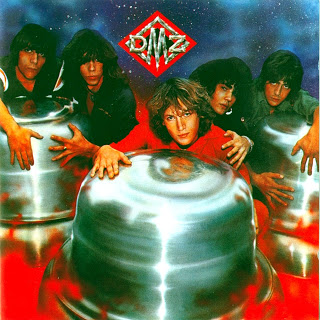
When we met I couldn't help but notice you weren't really happy with the Sire LP, I know you didn't like the sleeve for example. What can you tell me about this experience and being on a major label?
Well Greg Shaw obviously shared DMZ's vision. He understood we were a garage band and not a "punk" band. Our recordings on Bomp ended up sounding like a garage band. I don't think Sire cared enough to understand what we were. Both the sound of the Sire LP and the cover art came out sounding too much like generic 70s rock. At the time I think Sire was throwing a bunch of bands up against the wall to see if they stuck. They obviously directed the producers and their art department to deliver what was delivered...
I can totally understand what you mean but looking back at it I think it's still a good album and it's a bit underrated. What other bands did you feel connected to in Boston, well in New York too for that matter, at the time except for the Real Kids?
We played a lot of shows with the Ramones. Danny Fields, the Ramones manager, brought us to Sire and booked us with them many times. They were great and a big influence. In Boston, besides the Real Kids, I related more to the earlier Boston bands like the Modern Lovers and the Remains...
Was the Sire LP more or less the end of DMZ?
I quit in June of 1978 and headed back to Cincinnati to clear myself out and go back to school. They recruited another guitar player and did shows into the Fall of 1978 when DMZ called it quits.
How did DMZ turn into the Lyres?
Jeff started Lyres in the Winter of 78/79 while I was finishing up school and playing in the Customs in Cincinnati. Jeff managed to hold on to Paul Murphy and Rick Corraccio and recruited a long time friend of theirs Ricky Carmel AKA Little Man who had worked for the Real Kids. I saw them play in the Summer of 79 and thought they were great. Little Man quit at some point and the band was in disarray. When I got my degree in June of 1980 I moved back to Boston to play in Lyres.
I think DMZ is clearly part of the 70s and the Lyres part of the 80s. Did you feel the times a-changing back then?
Looking back both bands clearly approached it differently...

Ok, so the Customs happened between DMZ and the Lyres. How long were you around for?
Customs were between DMZ and Lyres. I moved to Cincinnati in July of '78 and started the Customs in the Fall. I stayed in Cincinnati and played in the Customs until June of 1980 when I received my degree from the University of Cincinnati and then moved back to Boston to play in Lyres...
Did you only release one 7"?
The Customs recorded their first 45 in the Winter of 78/79... and then recorded their second 45” Long Gone” the following Winter of 79/80 after reconfiguring the band members...
The Customs seem closer in sound to Barrence Whitfield and the Savages than both DMZ and the Lyres...
I guess the Customs were closer to the Savages as I was primarily responsible for the material and was not purely into garage music. I always liked rockabilly and R&B too although attacked in a garagey way...
I've got the compilation cd of the Customs which is great stuff. Did you join the Lyres in 1980 and were they already a functioning band at that point?
I joined Lyres in July '80 after finishing school. For the previous year Lyres were a mess. Jeff had huge turnover and quite a few pretty bad players during this time. The original band had left him in '79 for the same reason most people do... He might be the most narcissistic man on the planet who creatively finds ways to treat his bandmates with disrespect, probably making him feel better about himself, and then justifying it somehow. He is an awesome talent but it wears you down.
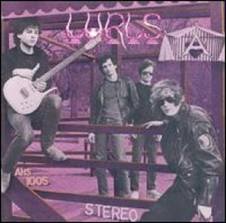
The ahs 1005 record is legendary in garage rock circles. Was that the first record/recording you did with them?
So when I joined we kind of cemented a lineup that would last a couple years with Mike Lewis from DMZ and my friend from high school and Howie Ferguson from Real Kids on bass and drums respectively. We recorded AHS 1005 in the winter of 80/81 and the Help You Ann 45 in the fall of 81. Howie, Lewis and I all quit soon thereafter at the end of 81. We couldn't take Jeff's crap anymore.
What happened then, why did you quit?
I ended up trying it one more time beginning in March 82. In this lineup we had the great Paul Murphy on drums and Phil Lenker, later of the Savages, on bass. A recent live show recently issued by Munster documents this period somewhat. By the end of ’82 Phil and I couldn't take it anymore and quit for the last time. We then formed the Savages...
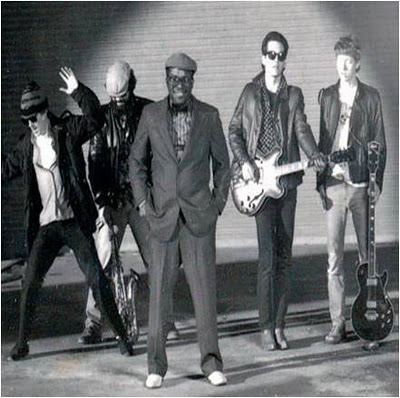
Ok, so how did the Savages come together. you and Phil were obviously from the Lyres, but how did you find Barrence?
Well, I had worked at a used record store in Boston in 1980/81 called Nuggets and had a bunch of friends who worked there. At some point I got fired by Andy Doherty, Nuggets Store Manager. Andy later left Nuggets to become the Savages manager and put out our first LP. A little later I quit Lyres and was in grad school, and had started up with Phil Lenker and Howie Ferguson (Lyres) and Steve LaGrega on Sax (also from Nuggets), what we thought would be an instrumental rock and roll band. We had begun practicing and it was sounding pretty good but something was still missing. Another friend at Nuggets, Des McDonald, told me he had heard Barrence Whitfield, another Nuggets employee, singing at the store and I better check him out. I got together with Barrence to listen to records one night and without hearing him sing except a little bit in my apartment offered him the job. A stroke of luck for sure! Later on Andy Doherty fired him too... I was always a big record collector and had always wanted to play the Little Richard style R&B. The closest thing I could get to it before Barrence Whitfield showed up was rockabilly or Lyres soul influenced garage rock and roll. Once Barrence Whitfield entered the equation there was lots of material that became possible.
The Savages must have sounded pretty alien coming out in the 80's. How did people react to you playing rhythm'n'blues and rock'n'roll stuff?
Because we approached our version of R&B like a garage/punk band and always wanted to COMPLETELY avoid the boring "blues" crowd and the associated "schtick", the Savages ended up playing lots of shows with punk and hardcore bands. It was a strange mix but we had the energy and could knock out most of the competition....
Ok, I'm pretty pleased with that, one last question: What's next in store for Peter Greenberg? New records, tours, savages... Please fill me in what we can expect in the near future?
Savages are playing a festival in France in a couple weeks. We've just booked a NYC show with Blowfly in the Fall too. But mostly we are gearing up for the new LP that we are recording again in Cincinnati in October. Most of the material is ready. I am hoping it will be better than the last one. We recorded Savage Kings cold. The band hadn't really played together. We got together, learned the songs and recorded the LP. We've been playing a lot since then and have had more time to develop the material as well as get comfortable playing together. We are planning to play a bunch of shows in the Midwest while there recording. It should be out late Spring on Munster and Shake It in the US. We will be back in Europe for an extended tour next year after the record comes out...